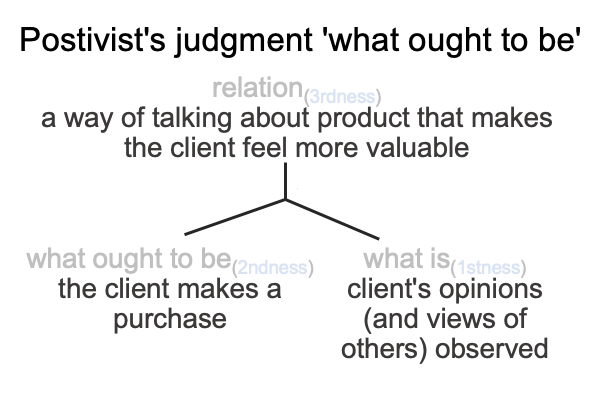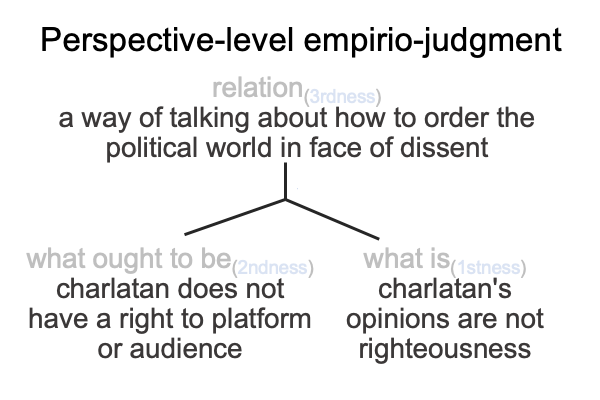0108 Of course, these two alliances do not do justice to chapter five, whose full title is “Public Relations as Post-truth Politics, Or the Marketisation of Everything”.
Yet, they do add a disturbing twist.
Capital expertise goes with marketization. Marketization constellates the capitalist one3c. Success2c is a judgment leading to a purchase. Experts are certified in sales, marketing, advertising and so on.
Social expertise goes with politicization. Politicization constellates the socialist one3c. Success2c is a judgment leading to a political commitment. Experts are certified in political science, social work and a myriad of other specialties.
Both constitute questionable boxes whose contents can hybridize with the positivist cross of scientism.
109 When that happens, the actionable judgment2c takes the essence (as well as the esse_ce) of an empirio-schematic judgment.
But, it2c is not empirio-schematic. It2c is empirio-normative.
It2c confounds what ought to be for the Positivist’s judgment with the structure of the empirio-schematic judgment.
Plus, it2c acts in the service of a relativist one3c.
0110 So, how is the fusion of capitalist and socialist expertise3b with scientific disciplinary language3b disturbing?
Remember the three battles among the enlightenment gods?
Their nominal dates are first, 1914 to 1918, second, 1938-1945 and third 1945-1989 AD.
The very last one was a cold, proxy-annihilating, contest between two materialist ideologies which could be labeled “capitalism” and “socialism”.
0111 These labels apply to the perspective-level normal contexts of interscopes containing two very different situation-level category-based nested forms.
Now (I am just wondering), if a hybridization of both the capitalist and the socialist questionable boxes and the positivist cross characterizes the post-truth condition that Fuller identifies, then doesn’t that imply that another battle among enlightenment gods is upon us?
Thank God, my bladder is empty!
Say nothing of my rectum.
0112 Okay, let me calm down and think about a scientific capitalist hybridization.
Here is a guess at what the perspective-level actionable judgment2c might be for a person3a,1a caught in the scientific capitalist one’s interscope.

A way of talking about a product that makes the client feel more valuable (which sounds like “marketing”; relation,thirdness,) brings observations of a client’s opinions (as well as others, including the general public; what is, firstness) into relation with a campaign leading a client to make a purchase (based on a psychometric model; what ought to be,secondness).
0113 Okay, that does not seem as potentially horrifying as the stories that the USSR told about the USA during the Cold War.
0114 Chapter six of Fuller’s book offers an example for a scientific socialist hybridization.
Perhaps, this one is more unsettling.
The example is an article by Byran Van Norden, appearing in a New York Times philosophy column in 2018. This article is acclaimed by the American Philosophy Association in 2019. (Then, COVID-19 comes to America in 2020.)
Fuller chooses this thought-piece because it displays the post-truth condition as (1) a contest over what is true and false concerning knowledge and (2) a dispute over the ways that matters are to be decided.
0115 Does that indicate that Fuller uses Norden’s opinion piece as a phenomenon that can be observed and included in a model of the post-truth condition?
Uh-oh.
0116 May I summarize Norden’s argument, as reported by Fuller?
Norden presents a complaint by expertise3b to the court of the relativist one3c.
There is a problem. And perhaps, one of the problems with my account of the problem is… um… me. I am not an expert, or worse, I may be one of those scrappy players that reads disciplinary literature and asks embarrassingly pointed questions. Or…
Well, let me not doddle. My bus arrives. Let me get on board.
0117 As far back as anyone can remember, stalwarts of modern philosophy, such as Rene Descartes (1596-1650 AD) and John Stuart Mill (1806-1873), promote a naive universality to rationality that empowers charlatans (read: scrappy players), such as the memorable mouthpiece Kellyanne Conway (who stands for someone who lacks expertise), to lay claim to “alternate facts”.
Of course, these “alternate facts” do not sit well with the well-informed readers of the New York Times… er… I mean to say “the public”. There is no need to explicitly formulate criteria whereby expert representatives of a right-minded “public”may set aside Conway’s claims as mere verbalizations that are both not legitimate and without merit. Instead, this advocate sets forth the following proposition.
Free speech does not entail the right to an audience.
Oh, I suppose that explains the title of the philosophical opus in the Stone, “The Ignorant Do Not Have The Right To An Audience”.
0118 But, wait! Stop the bus.
The inquirer will have to read the entire chapter in Fuller’s own excellent prose, because I have arrived at my destination.
Here is a picture of the resulting empirio-normative judgment.

0119 Norton offers an opportunity1c.
Norton offers a way of talking about how to order the political world in the face of the these scrappy players, such as Kellyanne Conway (relation, thirdness) that brings observations that the scrappy player’s opinions are not righteousness(what is, firstness) into relation with a model for how to proceed (what ought to be, secondness).
How should the scientismist one3c proceed?
Deny the scrappy player an audience.
This is Norton’s empirio-normative judgment2c.
0120 Empirio-normative?
Yes, success1c for the hybridization of the socialist one and the scientific one can be defined as a judgment that parodies the empirio-schematic judgment2c.
For this reason, when a Speaker of the U.S. House of Representatives, a Queen of Empirio-Normativism, proclaims, “Trust the science.”, she is really saying, “Trust my judgment.”
